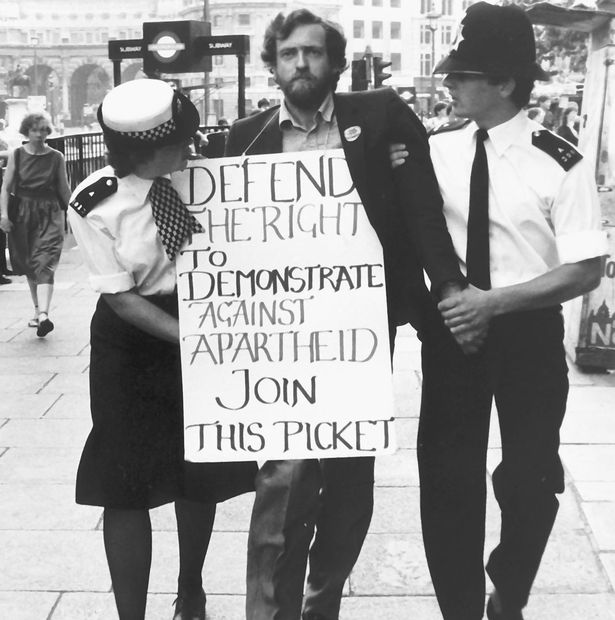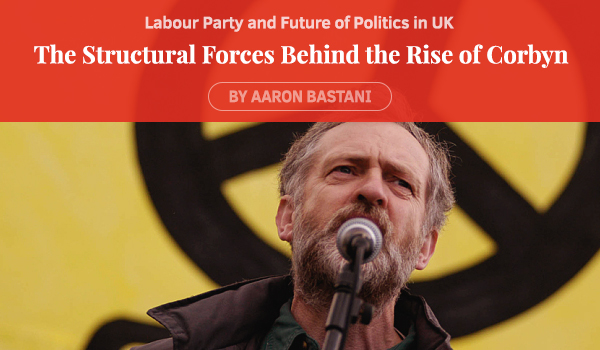Less than a month in leadership of the Labour party, Jeremy Corbyn has shifted the political scene in Britain. What was behind rise of Corbyn? What does it mean for future of politics in the UK?
On the 12th September Jeremy Corbyn, who began as the 200-1 outsider, became the newest leader of the British Labour Party. While that feat alone represented a remarkable victory, the sheer scale of Corbyn’s win is without precedent. The MP for Islington North beat his rivals in the very first round, winning 59% of first preferences and an astonishing quarter-of-a-million votes. Viewed for much of his career as the perennial rebel of the Labour back benches Corbyn, an MP since 1983, has now attained its highest rank. And all with the biggest mandate of any leader in British political history.
For most commentators, especially older more affluent ones, the default response to all of this has been a mix of shock and worldly exasperation. They didn’t see it coming and yet now, having happened, it was entirely predictable all along. For them the present moment is a spurious blip and the Labour membership, in choosing Corbyn, has rendered the party unelectable for a decade just as they did in choosing the left-wing Michael Foot more than thirty years ago. History is repeating itself, nothing more.

Precisely who voted for him, and in such significant numbers, seem to have come from two groups. Firstly there were the older supporters: those who grew disillusioned with the party during the Blair/ Brown years, characterised as they were by a historic embrace of Thatcherism and free markets. Then there are the young, a demographic surprisingly notable at the packed rallies the Corbyn campaign so intelligently used to create momentum over the Summer. These were students, people who had never participated in party politics before, the under-employed and the precarious. Those who had previously taken part in politics had tended to do so through single issue campaigns like Palestine solidarity, anti-fees or Living Wage activism. Others were previously despondent and now reanimated Liberal Democrat voters from 2010.
It is this second group – the young – which seems to be changing the very composition of the Labour Party and all at remarkable speed. In the last several months the average age of the party’s membership has fallen from from 53 to 42, with the majority of new members likely to be younger women. As well as getting younger it is also growing at a pace unseen for fifty years: the party has gained 150,000 members since the May general election with more 60,000 joining since Corbyn was declared leader. In a country beset by declining party memberships for the best part of half a century, this was never meant to happen. Its happening.
The re-engagement of older people – many former activists and members – with the Labour Party as it moves back to the left is readily explicable. Britain, after all, had one of the most powerful trade union movements in the world until the early 1980s. For the young to be joining and becoming so actively involved however, thus confounding those commentators eager to frame Corbyn’s politics as sentimentalising and outdated, is less easily dismissed.
And yet a structural explanation is there if one cares to look closely enough. What has happened to Britain since 2000, particularly in relation to its housing and labour markets, has meant a fundamental shift in the relationship between the average Brit, housing and asset ownership.
“An Englishman’s home is his castle” is a proverbial expression much favoured by the country’s right-wing print media. And yet extraordinary changes have occurred in the country’s housing market since the turn of the millennium, almost unnoticed. At present 5.4 million households are in the private rental sector, double what it was 15 years ago. As politically significant as that trend already is, it is compounded by the fact that a decade from now that figure is set to rise to 7.2 million, meaning that more households will be renting than homeowners. That will be unprecedented in Britain’s history as a liberal democracy. In a country where consent rests so firmly on home ownership – and where democracy is often preceded by the words ‘property-owning’ – the political overhead of such shifts will be significant. What we are seeing now, not only with the rise of Corbyn but a preference among the young north of the border for Scottish independence, is only the beginning. Over the forthcoming decade such trends are only set to persist and intensify.
Alongside changes in housing the relationship between employment and poverty is changing too. In 2015, for the first time ever, there were more working households in poverty than those out of work. That means that over half of Britain’s 13 million poor have a job. Being employed is no longer a guarantee of escaping poverty; as with changes to home ownership and renting that feels, to many, like a fundamental breach of the country’s social contract.
The transition to a mass rent economy and a society where work doesn’t pay is hollowing out consent, especially among a generation whose best hope is breaking even and asset inheritance from their more fortunate parents. While the UK has seen strong economic growth in the last several years – it never endured the kinds of unemployment seen across much of the Eurozone – the global financial crisis of 2008 still hit the country hard, leading to falling real pay for the longest period on record and stagnant productivity. That means that the British model of capitalism, which in terms of housing and decent pay for the many has been on a steep decline since the early 2000s, is now playing in extra time. No amount of GDP growth, mostly generated by the City and rentier capitalism, can disguise that. Many were shocked when the Conservatives won a majority in May, something they hadn’t done since 1992 – but that was more from a sense of fear among middle-income earners about things getting worse than a celebration of things having improved.
What has changed with Corbyn, and this magnificent surge of political will within and beyond the Labour left, is that the leader of the Opposition – unlike Ed Miliband – is setting out an alternative, saying it is possible for the UK to move to a high wage, low-rent economy.
The first aspect of that fix will be enabled through a higher national minimum wage – the current one is technically a poverty wage – and more state investment in specific industrial sectors; the second aspect through more social housing and the introduction of rent caps: limits on the amount landlords can legally charge.
Even if Corbyn fails to win the 2020 general election, and the mathematics on him forming a majority government are slim, the continuation of the structural changes in Britain’s economy over the last decade, detailed herein, will likely see these kinds of policy become the ‘centre’ of British politics.
Much of what Corbyn’s team is proposing, particularly his shadow chancellor John McDonnell, isn’t as radical as their critics insist. Indeed the animosity and fear-mongering levelled against them by a hostile media and Conservative government, and indeed the increasingly bizarre right wing of their own party, illustrates just how far right the centre of the political conversation has moved. One suspects that can’t last forever and that most Brits, particularly the young, will find the alternative to a low-wage, high-rent model all-too-alluring. The British establishment – by which I mean the media, financial interests and the Conservative Party – would isolate the new Labour leadership at their peril; they came close to losing a nation in last year’s referendum on Scottish independence, now they stand on the brink of losing one of the two historic parties of government.


